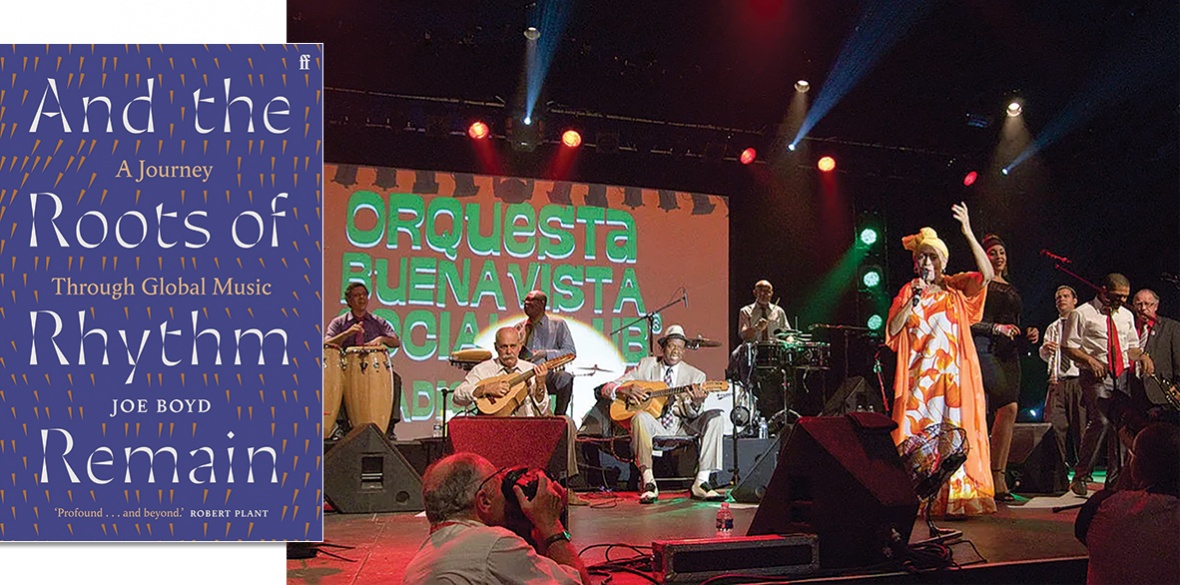This is the last article you can read this month
You can read more article this month
You can read more articles this month
Sorry your limit is up for this month
Reset on:
Please help support the Morning Star by subscribing here
And The Roots of Rhythm Remain – A Journey Through Global Music
Joe Boyd, Faber, £30
JOE BOYD’s music career began promoting blues music at Harvard University. He managed a British tour featuring Muddy Waters, Sister Rosetta Tharpe and others in 1964 and he was the sound engineer at the 1965 Newport Folk Festival when Dylan plugged in.
He was sent to Britain to establish Elektra Records’ office in London and started the underground UFO Club in 1966 and began producing records by Pink Floyd, Soft Machine, the Incredible String Band, Fairport Convention and later Toots & The Maytals and Billy Bragg as well as owning world music label Hannibal Records in the 1980s and writing a book about the ’60s music scene, White Bicycles, published in 2006.
In an interview for the Morning Star, he told me: “I started on Roots of Rhythm Remain after White Bicycles was published. Yes! Sixteen years ago! It took a while to get going. There are so many, deep, explorations of different musical cultures hiding in specialist and academic bookshelves. I’ve tried to bring some of the most interesting and important narratives from those wonderful experts into a broader readership — while giving full respect and credit to the pioneers.”
In 1987 he attended a meeting of music broadcasters including Charlie Gillett and Lucy Duran, alongside Robin Denselow of The Guardian, Nick Gold of World Circuit Records and Roger Armstrong of Ace/Globestyle Records and others who met in a London pub in an effort to sort out how to market foreign music on a £3,700 budget.
They coined the term “world music,” printed it on record bin dividers, the NME carried a free cassette and a PR person was employed. “It turned out to be the most effective PR money ever spent,” says Boyd.
“We got a lot of stick about ‘categorising’ artists and music,” says Boyd, “but all we were really doing is categorising the audience. If I wanted someone to notice my new Muzsikas album on Hannibal, that would be more likely to happen if it was racked next to Buena Vista Social Club or Youssou N’dour than next to a Hungarian rock band. It was a wonderful time when northern record buyers with money to spend met the greatest artists from many rich cultures.”
Although his book spans the globe — Latin America, west Africa, the Caribbean, India, China and central Europe — I asked Boyd how important Paul Simon’s Graceland album, (which features in the book), was for world/global music, and the claim that Simon broke the boycott of South Africa.
”Graceland was both part of a zeitgeist. An African cassette by the Boyoyo Boys found its way to Paul Simon’s car player because more people were seeking out ‘foreign’ music, as Western pop was becoming less interesting. I find two things curious about the reaction to Graceland: people were critical about it breaking the boycott while no-one said ‘boo’ about all the great theatre by South African playwright and author Athol Fugard, and the musical Sarafina! that came just as directly from South Africa as Graceland did. The secret of Graceland’s success lies in Simon’s respect for the undiluted strength of its mbaqanga (rural Zulu roots) beat.”
He also cites Cuba and The Buena Vista Social Club album as a milestone.
“The Buena Vista Club was founded in Havana in 1932, and Ry Cooder’s album featured so many great performers — a supergroup — and popular styles of Cuban music, including son, bolero and danzon. It sold half a million copies, which is unbelievable for a world music release.”
The book is packed with anecdotes: George Harrison discovering Ravi Shankar while lying in ZsaZsa Gabor’s bathtub; promoter Bill Graham, a 1950s champion mambo dancer, persuading Carlos Santana to listen to Latin American bandleader Tito Peunte’s music — creating a sound that stunned Woodstock in 1969 — and apartheid South Africa banning drums just in case they were used to send messages between different tribes!
Readings from the “door stop” (as he calls the 800-page plus tome) will take place across Britain and an audio book is planned. As Boyd says, this is “not a task for the weak-voiced or faint-hearted!”









